 PHOTO: Mary van Balen (Originally published in the Catholic Times, March 11, 2012 © 2012 Mary van Balen)
PHOTO: Mary van Balen (Originally published in the Catholic Times, March 11, 2012 © 2012 Mary van Balen)
The gospel reading about the rich man and Lazarus is familiar to most of us. Lazarus is a poor man who lies at the door of the rich man, hoping in vain for a scrap from his table. After a life of leisure and abundance, the rich man dies and finds himself tormented in the netherworld. Lazarus also dies, but he is taken to heaven and cradled in the bosom of Abraham. I often think of this reading as a reminder of the importance of caring for the needy among us, not only those struggling to survive materially, but also those impoverished of spirit. Today, however, I am struck by another message.
Once resigned to his fate, the rich man asks that someone be sent to his brothers who still live, that they might be warned and change their ways. Abraham says that cannot be done. He reminds the rich man that his brothers have Moses and the prophets to warn them. The rich man persists, saying that if Lazarus could go to his brothers, they would surely listen to someone come back from the dead. Again, Abraham says no. Even if someone were to rise from the dead, they would not listen.
I pondered this section of the gospel and thought about where the rich mans brothers looked for wisdom. Or did they?Did they assume they knew what was best? Was immediate reward what drove them? What about me? Where do I look for wisdom? Where do people in the modern world find it? We are bombarded with information, analysis, and advice from TV pundits to celebrities, from Internet to radio.
Recently, I watched motherly wisdom handed down from one generation to the next. A young woman, overwhelmed with the demands of her newborn child and unsure how to meet them, turned to her mother who had done a good job with three. Sometimes wisdom is obtained from those we trust and love.
Where we look and whom we ask depends on what kind of wisdom we are searching for. The rich mans brothers probably thought they had a good handle on how to live life. Their goals may have been simply wealth and comfort. Turns out they were as short sighted as the brother who had died first. Where we look for wisdom depends on our goals.
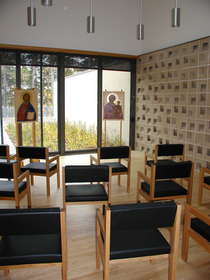 Lent is a time that reminds us to consider our goal. Whatever discipline or practices we are using to observe this season are meant to help us focus on what is most important in our lives: our relationship with the Holy One. That is not something apart from the rest of our lives, but rather integral to everything we do. How we interact with people at our workplace, what we do to recreate body and spirit, how we respond to needs of others, how we live with our families and friends.
Lent is a time that reminds us to consider our goal. Whatever discipline or practices we are using to observe this season are meant to help us focus on what is most important in our lives: our relationship with the Holy One. That is not something apart from the rest of our lives, but rather integral to everything we do. How we interact with people at our workplace, what we do to recreate body and spirit, how we respond to needs of others, how we live with our families and friends.
The rich man and his brothers likely did not read Moses or the Prophets to find out how to pursue their goals. We have the advantage of many sources of wisdom to help us in our search for deepening our relationship with God and the changes that makes in how we live our lives. We have Moses and the Prophets. We have the New Testament and examples of holy women and men who have gone before us and who live in the world today. Most importantly, we have Jesus Christ who did rise from the dead and who sent the Spirit to live within each of us.
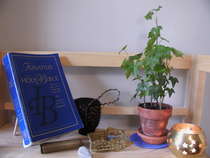 The Wisdom we seek dwells within, a gift of the Incarnation. These weeks are good times to reflect on using Scripture and other writing that feeds our spirits. It is a time to reflect on how our relationship with God influences our interaction with the world.
The Wisdom we seek dwells within, a gift of the Incarnation. These weeks are good times to reflect on using Scripture and other writing that feeds our spirits. It is a time to reflect on how our relationship with God influences our interaction with the world.
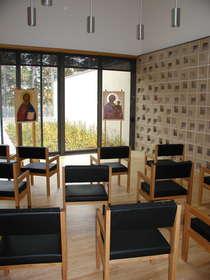
 Click “Works” tab to view my book Today is the feast of Saint Katharine Drexel, daughter of one of the wealthiest families in the United States in her lifetime. She was born in 1858 into the wealthy banking family, one of three daughters. When her father died, she, along with her sisters, inherited 90% of his fortune (He had tithed the rest to charitable organizations.)
Click “Works” tab to view my book Today is the feast of Saint Katharine Drexel, daughter of one of the wealthiest families in the United States in her lifetime. She was born in 1858 into the wealthy banking family, one of three daughters. When her father died, she, along with her sisters, inherited 90% of his fortune (He had tithed the rest to charitable organizations.)  PHOTO: Mary van Balen I didn’t know the aftermath of divorce would be so difficult, just like I didn’t know my marriage would be untenable. It isn’t what I miss. Surely the good that came of the marriage took root and lives. And of course there are my grown children. No, it is not the missing. It is the acceptance of who I am and where I am that is the struggle.
PHOTO: Mary van Balen I didn’t know the aftermath of divorce would be so difficult, just like I didn’t know my marriage would be untenable. It isn’t what I miss. Surely the good that came of the marriage took root and lives. And of course there are my grown children. No, it is not the missing. It is the acceptance of who I am and where I am that is the struggle. Solar engineer at the Barefoot College For I was hungry and you gave me food; I was thirsty and you gave me drink; I was a stranger and you made me welcome; naked and you clothed me, sick and you visited me, in prison and you came to see me. Then the virtuous will say to him in reply, Lord, when did we see you hungry and feed you; or thirsty and give you drink? When did we see you a stranger and make you welcome; naked and clothe you; sick or in prison and go to see you? And the King will answer, I tell you solemnly, in so far as you did this to one of the least of these brothers of mine, you did it to me. MT 25
Solar engineer at the Barefoot College For I was hungry and you gave me food; I was thirsty and you gave me drink; I was a stranger and you made me welcome; naked and you clothed me, sick and you visited me, in prison and you came to see me. Then the virtuous will say to him in reply, Lord, when did we see you hungry and feed you; or thirsty and give you drink? When did we see you a stranger and make you welcome; naked and clothe you; sick or in prison and go to see you? And the King will answer, I tell you solemnly, in so far as you did this to one of the least of these brothers of mine, you did it to me. MT 25 I lift up my eyes to the mountains:
I lift up my eyes to the mountains: Wall transformation chapel guest house St. John’s Abbey, Collegeville, MN PHOTO: Mary van Balen “I have set before you life and death, the blessing and the curse. Choose life, then, that you and your descendants may live, by loving the Lord, your God, heeding his voice, and holding fast to him. For that will mean life for you, a long life for you to live on the landthat the Lord swore he would give to your fathers Abraham, Isaac and Jacob.” Dt 30, 19-20
Wall transformation chapel guest house St. John’s Abbey, Collegeville, MN PHOTO: Mary van Balen “I have set before you life and death, the blessing and the curse. Choose life, then, that you and your descendants may live, by loving the Lord, your God, heeding his voice, and holding fast to him. For that will mean life for you, a long life for you to live on the landthat the Lord swore he would give to your fathers Abraham, Isaac and Jacob.” Dt 30, 19-20 PHOTO: Mary van Balen “Even now, says the Lord, turn to me with your whole heart, with fasting, and weeping, and mourning. Rend your hearts, not your garments, and turn to the Lord, your God. For God is great and merciful, slow to anger, rich in kindness, and relenting in punishments…” Joel
PHOTO: Mary van Balen “Even now, says the Lord, turn to me with your whole heart, with fasting, and weeping, and mourning. Rend your hearts, not your garments, and turn to the Lord, your God. For God is great and merciful, slow to anger, rich in kindness, and relenting in punishments…” Joel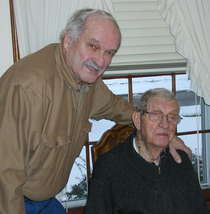
 PHOTO: Mary van Balen (First appeared in The Catholic Times, February 19, 2012 ©2012 Mary van Balen)
PHOTO: Mary van Balen (First appeared in The Catholic Times, February 19, 2012 ©2012 Mary van Balen)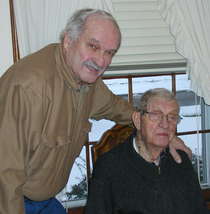 My brothers, sisters, and most of our cousins came to the funeral home to remember Adrian and share our stories. Afterward, we gathered at a local park shelter house to share food, laughter, and more stories. Death provided an opportunity for us to reconnect and to celebrate not only Adrians life, but also the lives of family and friends that were intertwined with his.
My brothers, sisters, and most of our cousins came to the funeral home to remember Adrian and share our stories. Afterward, we gathered at a local park shelter house to share food, laughter, and more stories. Death provided an opportunity for us to reconnect and to celebrate not only Adrians life, but also the lives of family and friends that were intertwined with his.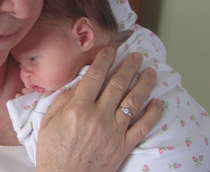 Liturgically, we are approaching Lent, when we celebrate the Paschal Mystery of Christs birth, death, and resurrection. This is the ultimate understanding of death leading to new life. Jesus was born lived his life, and in the end, was murdered by humanity that could not accept the challenge of love and compassion he proclaimed.
Liturgically, we are approaching Lent, when we celebrate the Paschal Mystery of Christs birth, death, and resurrection. This is the ultimate understanding of death leading to new life. Jesus was born lived his life, and in the end, was murdered by humanity that could not accept the challenge of love and compassion he proclaimed.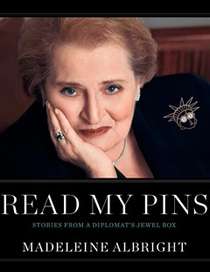
 PHOTO: Jennifer Holt While in Pittsburgh visiting the Carnegie Museum of Natural History, I enjoyed the exhibit,
PHOTO: Jennifer Holt While in Pittsburgh visiting the Carnegie Museum of Natural History, I enjoyed the exhibit,  Now, when I want to remember that I am but a small part of an infinitely large story, I wear them. When I want to be reminded of the wonder of creation and the One who put it in motion, I wear them. When I feel like celebrating life and its mysteries, reverencing what I cannot understand but what pours grace upon me, I wear them.
Now, when I want to remember that I am but a small part of an infinitely large story, I wear them. When I want to be reminded of the wonder of creation and the One who put it in motion, I wear them. When I feel like celebrating life and its mysteries, reverencing what I cannot understand but what pours grace upon me, I wear them. President Obama at the National Prayer Breakfast “And it’s a chance to step back for a moment, for us to come together as brothers and sisters and seek God’s face together. At a time when it’s easy to lose ourselves in the rush and clamor of our own lives, or get caught up in the noise and rancor that too often passes as politics today, these moments of prayer slow us down. They humble us. They remind us that no matter how much responsibility we have, how fancy our titles, how much power we think we hold, we are imperfect vessels. We can all benefit from turning to our Creator, listening to Him. Avoiding phony religiosity, listening to Him.” from
President Obama at the National Prayer Breakfast “And it’s a chance to step back for a moment, for us to come together as brothers and sisters and seek God’s face together. At a time when it’s easy to lose ourselves in the rush and clamor of our own lives, or get caught up in the noise and rancor that too often passes as politics today, these moments of prayer slow us down. They humble us. They remind us that no matter how much responsibility we have, how fancy our titles, how much power we think we hold, we are imperfect vessels. We can all benefit from turning to our Creator, listening to Him. Avoiding phony religiosity, listening to Him.” from